Yesterday, compost. Today, mulch. We're getting back to basics here this week, but these two topics are the heart and soul of healthy soils, and that's where happy gardens thrive.
To get started on my mulching post, I trotted out to the backyard, confident as could be with a trusty trowel in one hand, mini camera in my pocket. I peeled back a layer of mulch, dug down a few inches, and this is what I saw ...
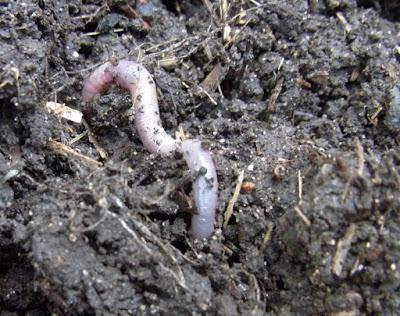 One of the reasons I am a keen mulcher is this person, and his/her million brothers and sisters. (Hang on Jamie, I think worms are hermaphrodites, so I'll change that to the much safer and more accurate "siblings".)
One of the reasons I am a keen mulcher is this person, and his/her million brothers and sisters. (Hang on Jamie, I think worms are hermaphrodites, so I'll change that to the much safer and more accurate "siblings".) I just knew if I lifted up some mulch and dug down that I'd find worms. They love a cool blanket covering their soil. In fact, I've noticed (completely unscientifically mind you) that in the places in the garden where the mulch has thinned out, there aren't so many worms when I dig there. In the heavily mulched spots, worms are plentiful. I do like the idea that they move around, and they have opinions.
If your soil has lots of worms, you're in a good place. Almost anything and everything you plant into soil thriving with worms should grow there. So that's the first reason I love to mulch my garden. It makes worms happy!
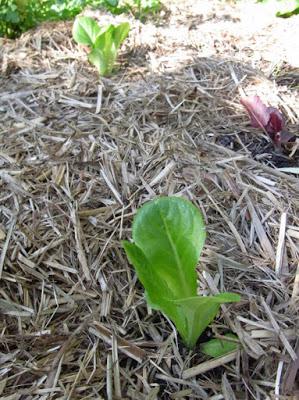
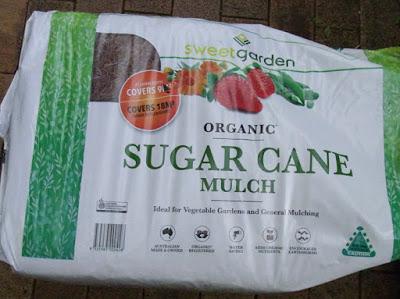
However I am fiercely loyal to a price point of no more than about $16 per bale. Any more than that and I won't buy it, any cheaper and I am your man. I love it when I can get a bale for $12 or even less. In our small garden, one compressed bale like this covers pretty much all the beds I mulch with hay.
I don't spread it too thick, either — just two or three inches — as there's plenty of evidence that a too-thick layer of mulch can prevent the water from lighter showers of rain ever reaching the soil below — and you don't want that to happen.
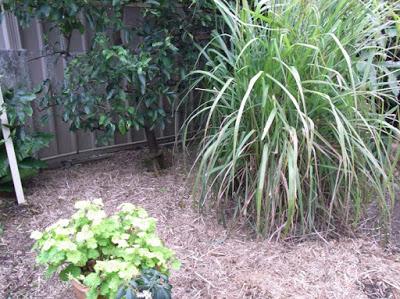
What's that big thing on the right? That's my lemongrass plant, and in about a week from now it will be getting its annual cut-down-to-the-ground trim, and it will be back to its beautiful, fragrant, willowy best by midsummer. It doesn't mind a bit of mulch around its root zone, either.
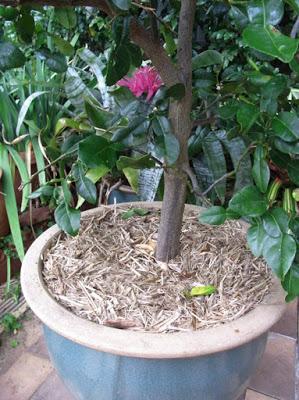
As for the mulch retaining moisture in the potted plants, I guess it does that, but I find potted plants need a power of watering to stay happy in Sydney, so no layer of mulch is ever going to stop my watering program. However, the mulch does provide some peace of mind if I go away for weekends.
Sure, there are other mulches, such as lucerne mulch, which the expert gardeners recommend. But have you seen how much that stuff costs? I am too much of a cheapskate to ever use lucerne mulch.
And pebble mulches, they look really cool. My whole succulent garden is covered in pebbles, and they are a truly hopeless mulch if you're hoping to suppress weeds. Onion weed just brushes pebbles aside.
At least the pebbles don't stay wet, like normal mulches do, and so the succulents don't get hopelessly soggy and die during one of Sydney's horrible wet weeks of constant downpours, which happen a few times every year.
And I do use coarse bark mulches in other spots where it's not so visible. It has the advantage of lasting much, much longer than sugar cane so it's a good investment if your budget is tight, but I find it a bit depressing to look at if there is too much of it.
But everywhere else, give me sugar cane mulch every time. I love the farmyard look when it's freshly spread, and my little mates the worms love it, too, which is good enough for me.
